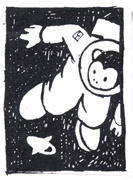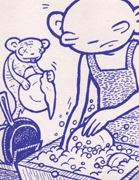
back inside cover of Cave-In #2 mini
When I first read Brian Ralph's comics, what struck me is how boy they are. Brian fills his comics with monsters, robots and monkeys, crazy action sequences, fight scenes and high adventure. Almost all of Brian's characters are the strong silent type, or at least the silent type. And yet.... his comics are intelligent and mysterious; they have a strong undercurrent of sweetness and sensitivity and are often down right cute. They are fantasy comics, but not in any sappy genre way. They are a fantasy, longed for and made real by a wholly original creator. So when I say, they are very BOY, I mean that in the best possible way.Brian Patrick Ralph joined me for tea in the lobby here at Hotel Girlhero recently on a blustery day. The traffic was bad, but Brian managed to show up on time, if slightly damp in a leaky green windbreaker. He smiled apologetically as he sat down to join me, windblown and dripping slightly on the pink lobby carpeting.
Brian is one of those cartoonists who have doggedly drawn comics off and on since childhood. While attending the Rhode Island School of Design (RISD) in the early 90's, he started a skateboard zine called Fireball, which contained a few comics and eventually evolved into an extremely accomplished minicomic. I met Brian in the summer of 1997 at the San Diego Comic Convention. Fireball had recently been mentioned favorably in The Comics Journal and he was working on a long story called Cave-In, parts of which he put out himself in adorable 5.5 X 4.25 minicomics with thick silk-screened covers. By this time, he'd graduated from RISD with a degree in illustration and was living together with a group of artists in an old warehouse in Providence, RI they called Fort Thunder. All of the Fort Thunder boys drew comics amidst other ambitious art projects and eked out a living with a silk screening business, odd jobs and pizza and doughnuts foraged from the garbage. Around this time, Brian met Tom Devlin, of Cambridge, MA, who was just starting up Highwater Books. In the summer of 1999, Highwater published the book version of Cave-In, for which Brian received lots of acclaim, including a nomination for an Eisner Award, which is the comic industry's highest honor.
Megan Kelso: What types of tea do you like, or would you prefer coffee?
Brian Ralph: I would love some tea thank you, quinceberry tea would be
great. And a little bit of sugar too please.MK: We have muffins, brie and crackers and apple slices this afternoon....
BR: Brie and apple slices sound good, but please don't go to too much trouble!
I am not so much in the mood for sweets, but the cheese would be great.MK: No problem, quinceberry tea, cheese and apples coming up. Now, on to the questions. I know you went to RISD---what years were you there and was art school helpful for you?
BR: I was at RISD from 92-96, I finished in four years, as in my family it would be a disgrace not to finish "on time." I was in illustration-- which was my major. I didn't learn anything much about cartooning, or comic books, I didn't learn any techniques, what nib to use, anything like that, but I did learn a lot about composition, and I took a great class with David Macaulay. He is the author of Castle, and Cathedral, and The Way Things Work. He wasn't much for actually teaching, but I learned a lot from him. I came out of school with a lot of valuable bits of knowledge.MK: When did you actually start drawing comics?
BR: I drew cartoons as a kid, I drew some superhero books, and I even had a
"Far Side" rip off comic that I would draw, it was kind of funny, I would draw the comics and send them in the mail to my sister, so I think she was the only person to see them. I didn't really draw cartoons in high school, but I DREW a lot, kind of cartoony, but not comics.MK: A lot of cartoonists have told tales of being discouraged from comics in art school...did that happen to you?
BR: While in college, I pretty much wanted just to paint, I sometimes did cartoons, but I wasn't really encouraged or discouraged to draw comics; although I did take a class one time that Doug Allen came to. He's a RISD grad. The comic book class was ok, but more geared toward superheroes. At least that was the one I took. Incidentally, the people I was in that class with ended up being Chris Hicks from Slave Labor's Mister Blank, and Andy Ristano, form Slave Labor's Life of a Fetus.
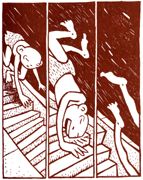
from Cave-In
ART VS. COMICS VS. CAREER
MK: Did you not think of comics then as a valid art form?
BR: I don't know, comics was really just something I did on the side when I had time, and then my more "serious work" was scratchboard illustration, and painting, but I never really considered the comics to be much of anything. It was just like doing a zine, I don't think I ever thought of it as something that belonged in a gallery. It's a tough thing. I often don't want my work to appear in galleries, it just doesn't feel right. I like for my work to appear in books, but not on the wall in a gallery.MK: since you went to art school, ostensibly to start some sort of "career" in art, how do you reconcile the whole art vs. comics vs. career thing?
BR: I struggle a lot with this, knowing I'll never make a living at what I do. It is so depressing. At first I didn't care, I didn't make the money and I was just happy to break even; I was very idealistic. Now that I have been getting older, I think my attitude has changed a lot. I think that no matter how big I get in comics, it still wouldn't bring me anything; even if I got huge, I'd still be scraping by. Like the highest you could go in comics was still not that high, and that depresses me sometimes. I always thought the money would come eventually, but it just doesn't. I don't want to sound greedy, I'm really not asking for much I think, but I look ahead at my life, and where I could go with comics, and it doesn't look too good. I used to hate people who said stuff like that. And now that's me. But when I think, I'd like to have a kid someday, and support a family, and I think about how I could possibly do that, it seems impossible. I was bummed, that for all the time I spent on comics, it just didn't pay the bills, and unlike the days at Fort Thunder, I now have bills to pay. So I ended up taking a job doing computer animation, and I was miserable. It made me so sad and miserable, that I really wanted to do comics, but instead took a dumb day job. But I was just tired of the constant hustle of trying to find illustration work, trying to get paid to draw comics; finally I got burned out. Every week I wondered how I was going to manage. Now I've been laid off from the computer job, and I am happy because I collect unemployment.MK: Do you have hope that eventually you'll find a balance between day jobs, paying the bills and having time for comics?
BR: It's something I'm struggling with. The only day job I've actually liked was my short time as a parking lot attendant, which I did covering for a friend while he was on vacation.
So, to answer your question, I don't consider myself to be an artist really, but I am embarrassed to tell people I draw comic books. When someone asks. I tell them I do magazine illustration, which is kind of true, maybe. I know everyone is trying to figure this out. What I'll end up doing probably is illustrating a bunch of weird things, and comics will become a hobby like model trains.MK: I once heard Tom Hart say something very similar and I freaked out because "hobby" sounded like he was giving up. But now I know what he meant. It's hard to tell people that what you "do" is comics, when you know you aren't really earning a living at it. So anyway, tell me about the years at Fort Thunder.
BR: Fort Thunder is a warehouse in providence, out in the Olneyville section, founded by Mat Brinkman and Brian Chippendale mostly. It's an old jewelry warehouse. It's a big place and always had ten or so people living there. I don't know how to really do it justice. It is the most insane place, constant chaos, floor to ceiling garbage and art, and bats and rats, everywhere. I was there for three years, no heat in the place, I had to sleep in a sleeping bag for all those years. It wasn't intended to be an arts commune or anything like that, it just so happened that most of the people there drew comics, and those who didn't just started drawing them. There was a print shop to silkscreen the covers.MK: I've seen a few, but not all the comics produced by the various Fort Thunder boys; it looks like you all kind of influenced each other.
BR: Yes. I was influenced by the best cartoonists I have ever seen. I honestly believe that the people who live there are the greatest of all time. I don't know. It was an amazing place; I think a lot of the inspiration for Cave-In came from there, it was almost cave like at times. It was a constantly changing landscape of garbage and found objects. The place is filled floor to ceiling with garbage and treasures. And the walls are filled with pictures and paintings. It's amazing. It's like a big Robert Rauschenberg collage. I made a living for awhile, silk-screening posters, record covers, comic book covers, and things like that. Fort thunder, [sighs] I mean it's an amazing place. Finally I just felt like I had had enough. I left because I felt like I wasn't going to continue to grow, I wanted to go out and do more things.
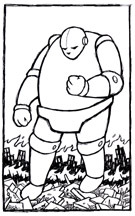
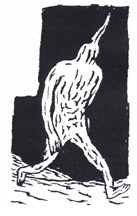
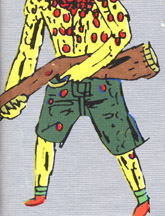
Brian Ralph:Fireball#5 Mat Brinkman:Monster #6 Brian Chippendale:Maggets Adrift (#4)
FIREBALL & MONSTER
MK: So do those things include more issues of Fireball? Or is that kind of over?
BR: I haven't given up on Fireball. It's up to issue number seven, I haven't done one in awhile just because I think some other comics have temporarily taken its place.MK: So how did Fireball start?
BR: I started in 1993, and I started by just drawing skateboard comics. It was more or less a skate zine. And slowly I started to get letters from comics fans, people that were into the comics and not so much the skateboarding, so I branched out into different areas, until it turned into a straight up mini comic. Tom (Devlin) wanted to collect it all, but honestly I was not too sure, I was kind of embarrassed of some of it; it was dated I think. Not representative of where I wanted to be. I will always be doing it I think. When you least expect, maybe I will hit you up with another Fireball issue. Who knows? It's all the same to me, just different names.
MK: What about the name? What's the deal with "Fireball?"
BR: Fireball was the name of this nasty cat that lived next door to me back when I started the comic. The cat would just come in our apartment and sit on the couch like he owned the place, and no one really minded, except he was kind of a mean and dirty cat. He didn't really want for you to pet him; he was kind of like a hobo cat. And he belonged to some
yuppies next door. When they called for him I think they called him Fireball, but now that I think about it he might have been Snowball. Anyway, that's where the name came from.
MK: I think that's great that your cool/tough skate zine turned mini was named after a kitty. To me that kind of epitomizes your aesthetic---tough on the outside, cute on the inside. So last time I saw you, back in 98 at SPX, you were working on editing this anthology called "Monster." It seemed like a real labor of love, showcasing lots of unknown cartoonists and such. What's up with Monster?BR: Monster was a product of Fort Thunder, and the concept was that the anthology never belonged to any single person, meaning anyone could edit an issue of it, so there were at times several issues happening simultaneously. It just had to be about monsters. It seems weird talking about a comic that I don't really know if anyone saw, maybe there are some copies locked in the Highwater vault. I know there were issues 1-4, and then I put out an issue 6. That one was the one that I think most people saw. Leif Goldberg did Monster 2000 which people can order straight from Fort Thunder (see address below). Right now, and for the past three years I have had a completed Monster 8.
MK: that must be the one I remember you working on.
BR: The paste up is all done and it's around100 pages, I just don't have the means to print it. I feel horrible about having it. I keep imagining a day when it will be done. I just can't afford to make a comic that big and I can't steal copies the way I used to. I think I have pretty much given up on doing anthologies, on trying to photocopy them, I'll leave that to the upstarts. After doing ten zillion copies, all those late nights, I don't think I can hack it for anything other than my own work. I will continue doing my own comics, but I think I won't try to carry the weight of all the unknown cartoonists on my back.
MK: I think a lot of people feel that pull between wanting to edit anthologies that help get other cartoonist's work out there whom they admire, but also need to conserve their energy for their own work.
BR: Yeah, back in the day, I had the means to steal millions of copies, I had the desire to just stay in the copy shop and make comics. Now, I hate standing in front of a Xerox machine. Monster was never so much a labor of love. It was something that had to be done, and we were the only people who could do it.
MK: Well, in a way, I think that is kind of the definition of a labor of love...
BR: Monster, I think has been replaced at the Fort by Paper Rodeo, a monthly free newspaper. So if anyone out there wants to do Monster, I think you can have it.MK: A simple concept. Anthology. Stories must be about monsters. Go to it, you young upstarts!!! So what about that other anthology, we were talking about awhile back? Your idea for the "how to" comic?
BR: That came to me in a dream actually. In the dream I was putting together an anthology, called "Try It" Cartoonists had sent comics about how to do things, how to fix a bike, how to cook cornbread, how to dance the cha-cha. And when I woke up I thought it was the best idea ever. I don't have many comics come to me in dreams, but sometimes I think I've drawn more than I have, because in a dream I will imagine I'm drawing. Then, when I wake up, I am disappointed to find things are not as far along as I'd dreamt.
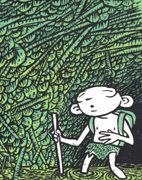
cover of Cave-In #2 mini
CAVE-IN
MK: Well, I think "Try It" is a fabulous idea. I think I'd contribute a comic about making dolls. Perhaps that's another one for the upstarts to edit! So, moving right along, Cave-In, your first book, came out at San Diego last summer (99). Are you happy with the finished product?
BR: Of course there are a ton of things I would have done differently, no doubt. I think it's a healthy thing to never be happy with your work. That is one of the things that keeps us going, if I was satisfied I would just sit around and never draw again. I don't think I've looked through it since it came out. I just wanted to keep moving. On to the next thing. I was excited about the awards, getting nominated for an Eisner, but it didn't feel very real, I felt so separated from it. I'll tell you what I am happy about, I really wanted Cave-In to take the whole comics business by surprise, and really make people wonder, and I think I accomplished that. I wanted all those people who read
Eightball, to pick up Cave-In and scratch their heads. If I could do it again, I think I would have made it 300 pages longer.MK: wow, then it would've been about as thick as it is wide...a little round-cornered cube. So speaking of not being like Eightball, your line has an unusual quality--sort of chunky, the way it ends often in right angles or a sort of "split end" as if you make the line by going over it numerous times. Can you explain your process? How you get that chunky scratchy look?
BR: I don't use a brush, I use a little Uni-ball pen.MK: You mean like those garden-variety office supply Uni-balls?
BR: Yes. And I do go over each line many times, to get a thick line. It's an easy way for me to control the line weight. I used to do a lot of scratchboard, and liked things to be scratchy and not so smooth.MK: So this is sort of like scratchboard in reverse, using the thin line of the Uni-ball pen as you would a scratch tool?
BR: Yeah. I think I never really aspired to use a brush the way other people do in comics, but also, using a pen was easier, and just allowed me to jump right in, and not have to practice, or worry about technique. It was a quick way to work and I just used whatever pen I could find on whatever paper. So basically that's my inking technique. A lot of people are really inking snobs, but I don't give a crap about that. I just want to keep drawing comics, and I don't feel like getting caught up in a bunch of technique. Boring. I think I am embarrassed sometimes by my originals, because they look junky. I was inspired by cartoonist Ben Jones; I think he draws with a blue ball point pen, and he does amazing work, it inspired me and made me feel OK about using a pen.MK: Well, seeing as how comics are really about the printed page and not the original, I think its very cool when cartoonists don't get to precious with their originals. Thinking of the original page as the true art object kind of defeats one of the whole points of comics, which is their mass produced accessibility. But Ironically, selling pages is one of the only ways some cartoonists make any real money. Have you been selling pages?
BR: A lot of people have been asking me if sell originals, and I have yet to actually sell one. I am not opposed to it. But like you said, I am more into the actual printed page, that's the finished product. It's weird to be standing there at a convention or whatever, and have your book of originals, and someone's looking at them; it's awkward. What if they don't want them, and they're like, "uh, no thanks." What's better is that at www.beguiling.com you can sell your originals and not have to deal with the pain of standing there while someone looks at your work, thinking to himself, "uggh these look crappy", or "200 bucks?! No way, maybe 40 bucks." So anyway, I'd rather do it online.MK: How big do you draw your originals?
BR: The panels I draw kind of vary. Cave-In I drew a little bigger than the size of the book, but it was all very small. I draw big panels. I don't often do more than three on a page; I don't know why I don't like the little panels so much. I just like the big ones.
I do a little bit of sketching, sometimes, but most of the time I do it right on the original page, and then I ink right over that. I know it's not the best way to work, but it's quick, and I like to work quickly. Some people really labor over every panel, and I would rather just keep it quick and fun.MK: Well, I happen to think keeping it fun is the only way one can keep doing comics, period! Can you describe your creative process? How a story is born and then how it eventually becomes a comic?
BR: I have little snippets of ideas, mostly things that have happened to me,
I'll take events and turn them into comics. When I start a comic I only have a vague idea of where it's headed, I know some of the characters and then I let the comic unfold. I just let the characters go. I know that might sound corny, but I let the characters take over and the thing just happens. The characters have a life of their own--- I honestly believe that, to the point that they just write the stories themselves. Each character has it's own personality, and playing them against each other is where I think I develop the ideas from. I tend to draw the exciting parts first and not worry too much about how all the parts will eventually fit. Then later, when I'm putting it all together, I'll see where I have to explain more, so then I draw more pages to link it all up. For instance, I added 25 pages to Cave-In at the very end when we were putting together the book for print at Tom's house. A lot of times I will work from the center of the story and work in both directions, it is honestly a fun way to work.
MK: Wow! I'd like to try that.
BR: I came up with a theory, that it's like playing a slot machine. Imagine the panels are all spinning and anything can happen, and one panel is finished, it's locked in. And then the next panels play off that panel, and then they all fall into place one after another like on a slot machine. Each one comes up in succession. The new story I am working on deals with characters travelling through time, so I can write in the past present and future as if they are all happening at the same time. I never set out to write insanely complex stories, or stories that even really have a point.MK: My theory is that we all have some major points we need to make in our work, even if we don't consciously know what they are. If we take care of the little things, the big things'll take care of themselves.
BR: That would be my one tip to cartoonists. Stop trying so hard to make good stories. When you stop trying, that's when it starts happening. God, there is nothing worse than someone trying to write stories, it is pathetic. Just start making comics and before you know it, you've done it. It's instinct.
MK: Ahh, the mystery of comics.
BR: I was honestly a little bummed out at the last SPX EXPO, there was a panel of cartoonists, Jessica Abel, Jason Lutes, Brian Biggs, and Jordan Crane---all cartoonist I have a lot of respect for, and I genuinely like the work they do. But all of them except Jordan were talking like they wanted to be filmmakers, instead of cartoonists. And I found that to be discouraging. They all said, basically, "we want to be making movies, but it's too expensive and there's too much involved, so comics is the next best thing." It was depressing to be at a comics convention and here are the best and brightest in the field and all they say is that they want to make movies. I don't want to make movies or novels or even comic strips. Just comics.
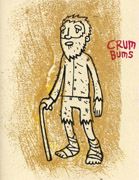
cover of Crum Bums #1 mini
CRUM BUMS
MK: Well that may just be another side of the self-deprecation that so many cartoonists feel they have to express when talking about doing comics as a "career" because it seems so damn pathetic to have chosen a career you can't actually make a living at. So Brian, I can only think of one story of yours that I've read where any characters spoke, and it was only briefly at the very end, it was the monkey in your Non #4 story...Wormhole? Silence is a dominant element-- or even force in your work-and yet you have visual implications of sound, like the boy who was playing harmonica in the Crum Bums mini. Why the silence?
BR: Well, from the beginning, I drew silent comics. I always wanted to draw silent comics, and I'll tell you why. Because I think that unlike a lot of people coming into this comic business, I came into this and I just wanted to draw things, and draw things HAPPENING. A lot of people want to write stories; they want to make movies. I thought words took away from the drawing; words were not needed. I thought I could get everything across in the pictures, since I told simple stories to begin with. To be honest, I never thought of the silence as an "element" I didn't think it was such a big deal, but everybody was saying, "wow you told this story without using words" like they couldn't believe it. But to me, that was the only way to do it. I didn't purposely leave out the words; it was just that no words were ever intended.MK: Well, that makes sense to me when, for instance, it's a story about a cave man and a rat or a robot, because with these creatures, it actually makes more sense that they don't talk than it would if they did talk. But it does seem odd when it's silent with humans, because human interactions almost always involve at least some speech. So are there implied conversations between people, even if you don't show what they say?
BR: At times, sounds happen, but just sounds. I don't think I've ever drawn people talking to each other until recently. I'll tell you why. My long time friend Paul brought up some things about Crum Bums that I had been feeling myself. He said the lack of words in Crum Bums actually hurt the comic, and seemed forced. I agreed that it was hurting the stories and was limiting me, so I figured, if one of these characters wants to talk, I'd let him talk. The monkey wanted to talk. The future punks don't need to talk. See? I honestly felt that I was stopping the characters from talking just because I was the guy who did silent comics. I just was like, heck with it. I'm just telling stories. And sometimes there needed to be talking. Not a lot of talking, but a little.MK: Well I'm glad you made that decision, because one thing I've liked about your silent comics, is that it somehow made sense in the world you had created, that this cave man or robot or monkey would not use speech. But I agree with your friend Paul, that in some stories, if you forced that rule, it would just become this gimmick. A little bit of speech can go a long way, after all.
BR: Yes, I don't like a lot of words in comics. God, sometimes you read a comic book and the pictures are like an afterthought. I think that sucks. Some people just want to write books and make movies, but instead they make comics, and it shows. They write books that have pictures. I think I make pictures. And some words. But I know I don't want to make a movie.MK: So you mentioned Crum Bums. This is your current big long project? I know you've put out one minicomic and are now continuing it in a weekly strip on www.highwaterbooks.com. Do you have an overall game plan for Crum Bums?
BR: Actually, the Crum Bums story is a part of a grander series of stories. The Crum Bums is actually an off shoot, or spin-off of a different story that was running in NON, and then I just started doing that one storyline at every opportunity, so it was in Maverick 2000, and then again in the EXPO anthology. Crum Bums, is basically about a monkey who gets tired of prehistoric life and wants to go to the future, he builds a time machine and gets to the future to find it is a total wasteland, and not much better than the place he left. He wants to go back to his friend the cave man, but the time machine is kind of broken. I have it more or less planned out, but not really. I mean, I know what can and can't happen, but I don't really know much more. That's how I do things. My overall game plan is to have it all collected in a Highwater book, laid out in a way that will finally make sense, from beginning to end.MK: So let me get this straight, you're doing chapters of this overall work called Crum Bums whenever you do stories in anthologies or minicomics, but eventually they'll all be collected?
BR: Basically, yeah. It is such a weird way to work, and I think there are only a handful of people that really can follow it all, but when you see the monkey, it's always the same monkey and it's always chapters of one big picture. It really just writes itself, a lot of times I don't feel I have any control, it just happens.MK: So doing a story in Maverick 2000---a Dark Horse book, that's kind of a step towards making comics more of a viable career, eh?
BR: Yeah, Diana Schutz from Maverick, a part of Dark Horse contacted me to do eight pages of anything I wanted in a book with Frank Miller, Paul Chadwick, Scott Morse, Dylan Horrocks, Stan Sakai, and some other people. They even sent me blue line paper to work on.MK: Wow. That must've made it feel like a real job! Also, Maverick 2000 must've made your work available to a wider readership.
BR: Yeah, it was so nice to get paid well for a comic, I really felt like that was the first time ever! I realized something about myself being in the Maverick book; that while I am a little bit more mainstream than the Fort Thunder guys, and some of the other cartoonists I like, I'm actually seen as an edgy underground alternative cartoonist to someone who is into superhero shit. Like someone who reads Hellboy might think I am like the alternative to Hellboy It's a weird niche, to be the alternative to the mainstream, but to be the mainstream to the real alternatives. Does that make sense?MK: Totally, and it's a good place to be because it gives you a lot of flexibility in terms of where you can get your work published, but it also fucks with people's rigid sense of what's mainstream and what's alternative and what's genre, etc. In my opinion, that can only be for the good. So gee Brian, you don't sound THAT busy (ha ha), what else are you working on?
BR: Well, I've been doing a comic in Giant Robot magazine, on the back page, taking over where Dave Choe left off; why he stopped doing it I don't know. It's a monkey, but not the Crum Bums monkey and a robot and they travel around and they have super weird powers. It's only one page per issue so it's been difficult for me to get a lot done in one episode. A lot of people think it's "lighter" than my normal stuff, and that's basically true. It's Brian, but Magazine Brian, not Comic Book Brian, meaning it's intended for an audience that doesn't normally read comics. Eric the publisher and myself have been discussing a bi-weekly strip on his website, www.giantrobot.com so look for that shortly after SPX.MK: And now you've got the Crum Bums every Tuesday on www.highwaterbooks.com.
BR: Yes, and I have some other weird Internet dealings I'm working on, nothing I want to discuss really, good stuff, but not ready to be disclosed.MK: Ahh...the Internet and non-disclosure agreements. I get it. A whole new world for us cartoonists, isn't it?
BR: The Internet is funny, it seems like a possible way for cartoonists to make money and survive. I would never say its the future of comics, comics should never be on anything other than paper, but there is some help for the industry online. It's not the cure, but it can help to employ some people.MK: I actually believe the Internet is going to need us as much as we need it. But I want to get back to monkeys and robots and of course monsters and cave men as well. These non-verbal, sort of archetypal characters-they're very BOY and clearly appeal to the people who love superheroes, but they also speak to me, I think because they are cute and poignant, and seem to be operating on more than one level. Why are you drawn to them?
BR: The thing about these characters is that they aren't human, but they have all the human characteristics. They are a lot more interesting to work with and I feel they have a lot more range. The monkey is fun to draw, and everybody loves monkeys, because we ARE monkeys and monkeys are human more or less, but they are cute. A lot of people will feel sad for a monkey. For example, a monkey lost in space is far more depressing than a normal person lost in space. People don't care about reading about other people. They want to read about monkeys and little turtles.
MK: Well....not always.
BR: That's what I think, at least. But it has to be done well, I mean I don't want to read about Dave Cho's monkeys and frogs or whatever the hell he does. I mean, I'm not into anthropomorphic stuff either. It's a fine line.MK: Yes, but I think you stay on the right side of that line. Your monkey may be a stand-in for a human metaphorically, but in terms of the story, he's always totally a monkey.
BR: The robot is fun in the same way, and I think basically the cave-man and the robot are the same character, I always seem to have one character who is really dumb. I go to these characters because it helps me to escape. And it helps the reader too; with these characters we can escape into the comic. If I draw humans, the comic still belongs to the world, as we know it. Frankly I don't really want to draw comics about human beings, not really--- I don't like that. I draw a weird sort of fantasy world. I don't want my characters to have to worry about coffee and beer and Kurt Cobain, and the things that happen in our world. I don't want to draw Optic Nerve. I don't want ska to exist in my world.
MK: hear hear! Three cheers for fantasy comics!
BR: That's why I try hard to draw worlds that aren't the present day, I draw caves and apocalypse. That's one of the reasons I started drawing Cave-In, I wanted to do something that was a million miles away from Eightball. Mat [Brinkman] once told me that we have to make comics, because no one else draws the comics we want to read. And that's why we do it! Because no one makes the comic I want to be made. So I have to make it myself. But the downside of it is that here I am about to turn 27, and most people my age are making all this money doing websites, and I'm happy to sell a $2 mini comic! I mean, it's kind of screwed up.MK: Well looking on the bright side, Brian, when will we see Crum Bums the book?
BR: I'm hoping to put it out with Highwater, ready for San Diego 2001, but the timing is really up to Tom. I have very vague plans to do a Cave-In 2, maybe, but who knows? Maybe that won't happen until I am 70 years old.
MK: Well, I like the idea of Cave-In at 70, and I'm sure you have a few other ideas up your sleeve in the meantime. But you'd better get going or you're totally going to get caught in rush hour traffic. Thank you so much for coming by!
BR: Thank you, MeganBy now, Brian and I had polished off all the apples and cheese and quinceberry tea, and he had thoroughly dried off. The rain had let up and he walked out onto the sidewalk pausing for a moment, as if he'd forgotten how to get home. He recently moved to a new town to be with his girlfriend, so he's still a little disoriented. First, he stepped to the right, then quickly changed his mind and headed left, almost tripping on the sidewalk as he tried to fix his windbreaker. I hope he comes back soon for a drink in the hotel bar. He left me with contact information and a list of REQUIRED READING for all you comic fans out there.
